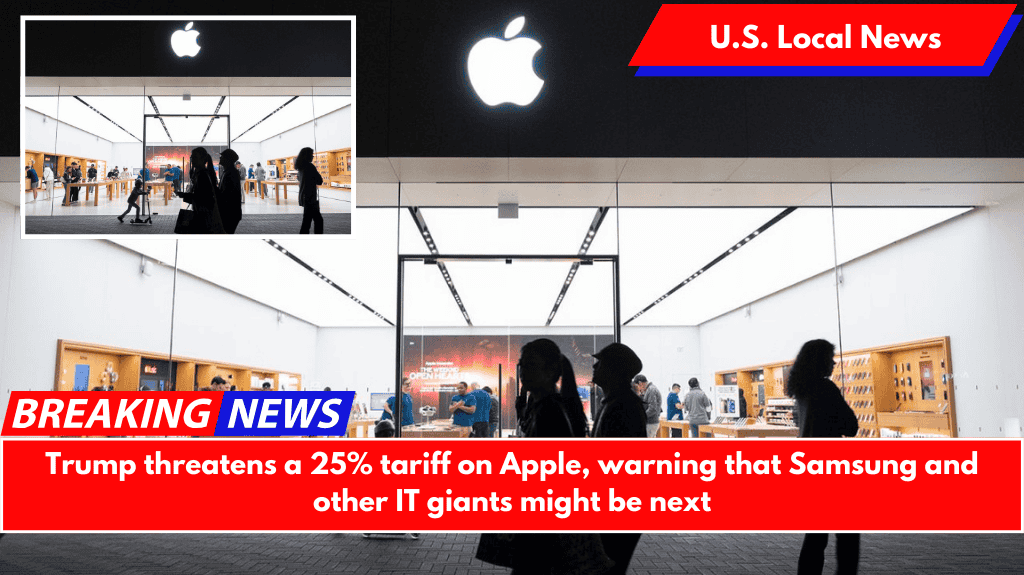President Donald Trump demanded on Friday that Apple and other smartphone makers, including Samsung, manufacture their phones in the United States or face a 25% tariff.
“I have long ago informed Tim Cook of Apple that I expect their iPhone’s that will be sold in the United States of America will be manufactured and built in the United States, not India, or anyplace else,” Trump wrote on Friday morning’s Truth Social. “If that is not the case, a Tariff of at least 25% must be paid by Apple to the U.S.”
Trump told the press in the Oval Office on Friday, after signing executive orders, that the tariff would apply to any phone maker selling devices in the United States.
“There would be more. It would also include Samsung and anyone who manufactures that product,” Trump told reporters. “Otherwise it wouldn’t be fair.”
During his Middle East trip last week, Trump expressed displeasure with Apple CEO Tim Cook over the company’s plan to manufacture iPhones for sale in the United States at newly built plants in India.
Apple had been working for several years to diversify its production capabilities. Some iPhone production had already moved to India, and on Apple’s earnings call with investors earlier this month, Cook stated that “the majority of iPhones sold in the US will have India as their country of origin.”
On the call, Cook predicted that Apple would face a tariff burden of up to $900 million this quarter. However, it could have been much worse: Apple and other US tech companies won a major victory last month when Trump exempted electronics from his massive tariffs on China.
Unlike Apple, Samsung does not rely on China for smartphone manufacturing. The South Korean tech behemoth closed its last phone factory in China in 2019 after losing market share to domestic competitors, though it still operates there. Samsung sources previously told CNN that the vast majority of its smartphones are manufactured in South Korea, Vietnam, India, and Brazil.
Despite lowering his tariff on most Chinese goods to at least 30%, down from 145% earlier this month, the majority of goods entering the US still face a 10% universal tariff. Wedbush Securities estimates that roughly 90% of Apple’s iPhone production and assembly takes place in China.
Trump met with Cook in Riyadh last week to kick off his Middle East trip. In Qatar, he criticized Cook’s plan to manufacture iPhones for the United States in India.
“I had a little problem with Tim Cook,” Trump said last week in Qatar. “I told him, ‘Tim, you’re my friend. I treated you very well. You’re coming in with $500 billion. But now I hear you are expanding all over India. “I don’t want you to build in India.”
An administration official told CNN that Cook met with Trump again at the White House on Tuesday. The official did not reveal what the meeting was about.
Treasury Secretary Scott Bessent told Fox News on Friday morning that Trump is attempting to “bring back precision manufacturing to the US.”
“I think that one of our greatest vulnerabilities are these, is this external production, especially in semiconductors, and a large part of Apple’s components are in semiconductors,” Bessent told the audience. “So we would like to have Apple help us make the semiconductor supply chain more secure.”
Apple already manufactures some of its chips in the United States through a partnership with TSMC, which recently opened a chip manufacturing plant in Arizona. The company did not immediately respond to a request for comment.
‘Those jobs aren’t coming back’
The world’s most valuable publicly traded company is flush with cash and generates enormous profits — more than any company in history. However, Apple has long claimed that it is unable to manufacture iPhones in America.
Apple has spent billions of dollars training millions of skilled engineers worldwide. China and India, with their large populations, simply have more skilled engineers than the United States. And it costs Apple significantly less to pay those employees.
Apple’s late CEO, Steve Jobs, famously raised the issue during a meeting with former President Barack Obama in October 2010. He cited America’s subpar education system as a barrier for Apple, which required 30,000 industrial engineers to support its on-site factory workers.
“You can’t find that many in America to hire,” Jobs told Obama, according to his biographer, Walter Isaacson. “If you could educate these engineers, we could move more manufacturing plants here.”
In a 2012 interview with tech journalists Kara Swisher and Walt Mossberg, Apple CEO Tim Cook expressed his agreement with Jobs’ assessment. When asked if Apple products would ever be made in the US, he stated, “I want there to be…” You can bet that we will use all of our influence on this.”
The idea that Apple could reshore iPhone production is “fictional,” according to Dan Ives, global head of technology research at financial services firm Wedbush Securities, who told CNN’s Erin Burnett last month.
He predicted that iPhones made in the United States would cost more than three times their current price of around $1,000, due to the need to replicate Asia’s highly complex production ecosystem.
“You build that (supply chain) in the US with a fab in West Virginia and New Jersey, they’ll be $3,500 iPhones,” he said, referring to fabrication plants, or high-tech manufacturing facilities where computer chips that power electronic devices are normally made.
Even so, Ives told Burnett that moving just 10% of Apple’s supply chain to the United States would cost around $30 billion and take three years.
Ives reiterated that stance in a statement following Trump’s tariff threat on Friday, saying, “The concept of Apple producing iPhones in the US is a fairy tale that is not feasible.” He estimated that moving all of Apple’s iPhone production to the United States would take between five and ten years.
An additional 25% tariff on Apple products could raise prices for US iPhone buyers. Rumors have already circulated that Apple is considering raising prices when it releases its new iPhone lineup in the fall, which could irritate Trump even more, though the company will most likely avoid directly attributing the increases to tariffs.
According to Gene Munster, managing partner at Deepwater Asset Management, it will be difficult for Apple to avoid raising iPhone prices if tariffs of 30% or higher are imposed.
“Anything below 30, they will probably carry the vast majority of that increase,” he told me. “But I think at some point they’re going to have to start to share it.”
While moving iPhone production to the United States may not be feasible, Apple did announce a $500 billion investment to expand its US facilities earlier this year, presumably in an effort to appease Trump.
The company stated that the investment would establish a new server manufacturing facility in Houston to support Apple Intelligence, its new brand of artificial intelligence products, which were previously manufactured outside of the United States.
It will also increase data center capacity in several states, as well as invest in corporate facilities and Apple TV+ show production in 20 states, among other initiatives.











